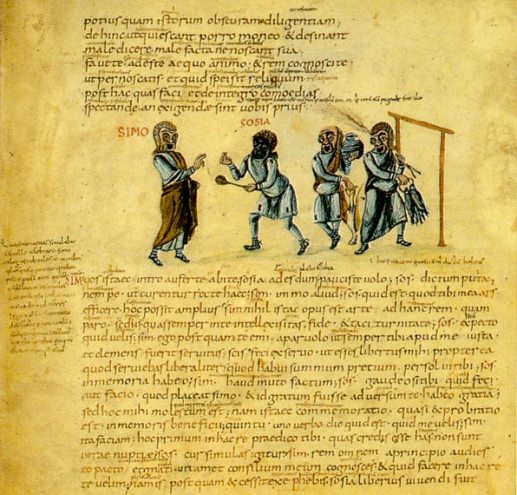Classics 351
March 24, 2022

Terence’s Hecyra (“The Mother-in-Law”; 165-160 BCE)
- two failed performances (165 BCE at Megalensian Festival, 160 BCE at Funeral Games for Aemilius Paullus), one successful (160 BCE)
- prologues for second and third performances survive; last delivered by Lucius Ambivius Turpio, Terence's "producer" (Lat. actor; our "actor" = histrio), "dressed as the prologue-speaker" (9)
Prologue, 3rd Performance (Hecyra 31-42)
That blight [of Hecyra's failed performances] your intelligence will cure, if it will come to the aid of our efforts. When I first began to perform it, there was talk of a boxing match, and there were also hopes of a tightrope walker too; slaves were arriving, there was a din, women were screaming—these things forced me to leave the stage before I'd reached the end. I began to follow my old custom with this new play, and I tried again: I brought it back anew. The first part went down well; but then word got around that a show of gladiators was going to be given: people flocked together, there was an uproar, they were shouting and fighting for a place. While that was going on, it was impossible for me to hold my place. Now there is no disturbance ...
- Terence's prologues (cf. usual topics: contamination, plagiarism, patronage, ghost-writing); final plea for a fair hearing with promise of future plays (55-57)
- Hecyra's challenges to spectators: complex plot with surprises & misunderstandings, challenge to comic stereotypes (and Roman patriarchy?), serious issue of divorce & fate of baby?

Roman marriage vows (4th century CE sarcophagus)
- opening expository scenes before houses of Bacchis, Laches, Phidippus (58-195): Philotis and Syra (Bacchis's colleagues), Parmeno joins them (back from harbor with news of Pamphilus's arrival)
Hecyra 71-74 (prostitutes comment on Pamphilus's marriage & betrayal of Bacchis; stereotypes)
Philotis
But it must be wrong to treat them all the same.
Syra
Wrong, is it, to punish your enemies, or for them to be caught the same way they try to catch you? Dearie, dearie me! Why don't I have your age and your looks, or why don't you have my views?
- what gossipy Parmeno knows/believes:
(1) Pamphilus's & Philumena's marriage in jeopardy (100ff.);
(2) arranged marriage at Laches's insistence initially not consummated (115ff.); Pamphilus still with Bacchis
(3)
Bacchis became "more difficult and demanding" and Pamphilus fell in love with his wife (158ff.), "a wife with a character well suited to him";
(4)
Pamphilus sent away to settle relative's estate, left Philumena with his mother Sostrata (171ff.);
(5)
dramatic present: Philumena returned to her mother (Myrrina) for unclear reasons, fathers (Laches & Phidippus) dealing with matter (182ff.); misogynistic views later revealed to Pamphilus ("these women generally are as fickle-minded as children", 312)
- Parmeno's "cleverness" and ultimate role in the comedy?
- ignorance, misunderstanding, imperious arrogance: the rash patriarchs, Laches (father of Pamphilus) & Phidippus (father of Philumela): misconceptions about wives & mothers-in-law? about Bacchis?
Hecyra 198-204 (Laches's entrance)
In the name of gods and men, what sort of trouble is this? What sort of conspiracy's going on? Look how all women want and don't want exactly the same things all the time! You won't find one of them deviating the slightest bit from the character of the others! The're all equally determined to oppose their husbands, they're all equally obstinate, they've all been trained at wickedness in the same school, as far as I can see! And if there is such a school, I know perfectly well that this woman's in charge of it!
Hecyra 529-535 (Phidippus finds out about the birth and assumes Myrrina resents Pamphilus for his affair)
How could you be so obstinate that you preferred to have the baby die, when you knew he could make the friendship between our families more secure from now on, rather than see her married to that boy against your wishes? And I thought they were to blame, when it's your fault!
- Pamphilus (adulescens): his character? his "honor" (403) after informed of "brute's" rape (383)? unusual rape & ring?
Hecyra 403-408 (Pamphilus exits from Phidippus's house)
But as for taking her back, I don't think that's at all honourable, and I won't do it, even though I'm deeply in love with her and feel the pull of our relationship. I weep to think what my life's going to be like from now on, and how lonely I'm going to be: no one enjoys good luck for ever! But my previous affair has already trained me for this: I deliberately put that one out of my mind, and I'll work on this one in the same way.
Hecyra 444-448 (Pamphilus hides behind filial duty)
I just don't know how I can keep hidden what Myrrina asked me to, the fact that her daughter's having a baby. I'm sorry for the woman: I'll do what I can, but I must do my duty—I have to give more weight to my mother than to my love.
- Mothers-in-law, Sostrata & Myrrina: stereotype? their characters & interests (perilous positions)?
Hecyra 595-600 (Sostrata tells Pamphilus she'll retire to the country)
I don't want anyone to feel I'm getting in their way by living so long or to be waiting for me to die. I can see that I'm hated here, even if I don't deserve it: it's time for me to withdraw. That will be the best way, I think, for me to remove all grounds of suspicion, and I'll fall in with their wishes. Please allow me to escape from the bad reputation that most women have to put up with!

Roman spintria (brothel token?)
- Bacchis: an honorable meretrix ex machina with an unusual code of conduct?
Hecyra 757-760 (to Laches)
But I don't want your son to be suspected because of false rumors, and I don't want you to think him at all irresponsible: you're the last people who ought to think that, and he doesn't deserve it. What he does deserve from me is that I should help him as much as I can.
Hecyra 777-779
I must make sure that Pamphilus' wife returns to him. If I can achieve this, I don't mind getting a name for having been the only woman to do what other prostitutes can't face doing.
**PERFORMANCE**: Hecyra 815-880, Finn (Bacchis), Viktor (Pamphilus), Parmeno
- finale: female characters' offstage solidarity; metatheater & (mis)understanding; imperfect realities of a comic ending
Hecyra 833-840 (to audience after truth divulged)
I'm glad that all these joys have come to him thanks to me, even if other prostitutes don't want that—after all, it's not in our interests for any lover to enjoy the pleasure of a marriage ... For as long as I was allowed to, I found him to be generous and charming and good company. His marrying didn't suit me, I don't deny it, and I really don't think I'd behaved so as to deserve to have it happen to me. But when you've enjoyed a lot of good times with a man, it's right to put up with the bad times he causes.
Hecyra 866-867 (Pamphilus to Bacchis)
There's no need to breathe a word about it, either. I think it's best if this doesn't turn out the way
things do in comedies, where everyone finds out about everything. In this case, those who needed to find out do know; but those who ought not to know won't find out and won't know about it.



